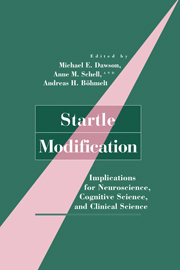Book contents
- Frontmatter
- Contents
- Contributors
- Preface
- Prologue: A Historical Note on the “Discovery” of Startle Modification
- 1 Startle Modification: Introduction and Overview
- PART I BASIC PARADIGMS, METHODS, AND PHENOMENA
- PART II PHYSIOLOGICAL MEDIATION OF STARTLE MODIFICATION
- PART III PSYCHOLOGICAL MEDIATION OF STARTLE MODIFICATION
- PART IV INDIVIDUAL DIFFERENCES AND STARTLE MODIFICATION
- 9 Affective Individual Differences, Psychopathology, and Startle Reflex Modification
- 10 Psychopathic Traits and Intoxicated States: Affective Concomitants and Conceptual Links
- 11 Schizophrenia Spectrum Disorders
- 12 Startle Modification in Children and Developmental Effects
- PART V RELATIONSHIPS WITH OTHER PARADIGMS AND MEASURES
- References
- Author Index
- Subject Index
10 - Psychopathic Traits and Intoxicated States: Affective Concomitants and Conceptual Links
Published online by Cambridge University Press: 26 March 2010
- Frontmatter
- Contents
- Contributors
- Preface
- Prologue: A Historical Note on the “Discovery” of Startle Modification
- 1 Startle Modification: Introduction and Overview
- PART I BASIC PARADIGMS, METHODS, AND PHENOMENA
- PART II PHYSIOLOGICAL MEDIATION OF STARTLE MODIFICATION
- PART III PSYCHOLOGICAL MEDIATION OF STARTLE MODIFICATION
- PART IV INDIVIDUAL DIFFERENCES AND STARTLE MODIFICATION
- 9 Affective Individual Differences, Psychopathology, and Startle Reflex Modification
- 10 Psychopathic Traits and Intoxicated States: Affective Concomitants and Conceptual Links
- 11 Schizophrenia Spectrum Disorders
- 12 Startle Modification in Children and Developmental Effects
- PART V RELATIONSHIPS WITH OTHER PARADIGMS AND MEASURES
- References
- Author Index
- Subject Index
Summary
ABSTRACT
Striking parallels are evident in the phenomena of psychopathic personality and acute alcohol intoxication. Both are characterized by disinhibited behavior (including heightened aggression, deviant sexual expression, thrillseeking, and irresponsibility) and a disregard for the potentially harmful consequences of such actions. Both are hypothesized to involve disruptions of normal affective and cognitive processes. There is also substantial evidence for a relationship between antisocial personality traits and alcoholism.
This chapter reviews startle-probe investigations of emotional processing in criminal psychopaths and in alcohol-intoxicated normals. Its essential themes are that (1) core affective deficits are associated not with the disinhibitory behavioral features of psychopathy, but with the classic personality symptoms, and (2) alcohol appears to suppress emotional responsiveness not at a primary level, but indirectly, through its effects on higher cognitive processes. We argue for the probable existence of a significant subgroup of antisocial offenders who are analogous to intoxicated normal individuals in their proneness to disinhibited behavior, but are distinct from “primary” psychopaths in that they do not exhibit emotional detachment. Alcohol intoxication (as well as other pharmacological state manipulations) may provide a valuable heuristic for analyzing cognitive-emotional processes underlying persistent antisociality not attributable to a primary deficit in affective response capacity.
Overview: Disinhibitory Traits and States
Popular theories of behavioral deviance in antisocial personality rest heavily on the thesis that those exhibiting such behavior are deficient in their capacity to react fearfully when circumstances warrant it. However, recent theoretical and empirical work suggests that the disinhibitory behavioral features of psychopathy are dissociable from the emotional detachment that is regarded as the essence of the classic syndrome (Cleckley, 1976).
- Type
- Chapter
- Information
- Startle ModificationImplications for Neuroscience, Cognitive Science, and Clinical Science, pp. 209 - 230Publisher: Cambridge University PressPrint publication year: 1999
- 21
- Cited by



